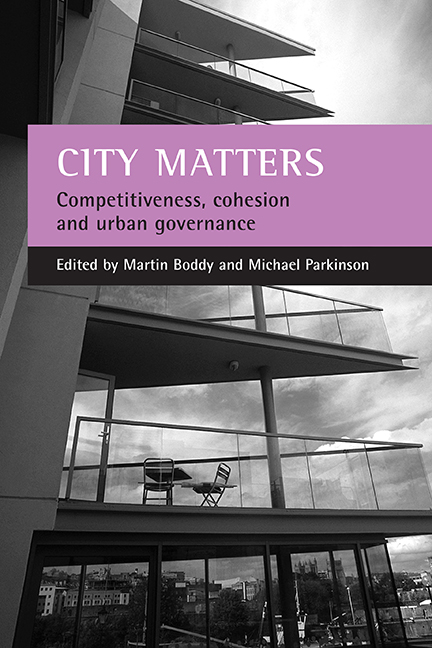Book contents
- Frontmatter
- Contents
- List of tables and figures
- Foreword
- Acknowledgements
- Notes on contributors
- one Introduction
- Part One Competitiveness, cohesion and urban governance
- Part Two Competitiveness and urban change
- Part Three Competitiveness, innovation and the knowledge economy
- Part Four Housing, property and economic performance
- Part Five Space, place and social cohesion
- Part Six Ethnicity, enterprise and social cohesion
- Part Seven Leadership, governance and social capital
- Conclusions
- Index
fifteen - The middle class and the future of London
Published online by Cambridge University Press: 20 January 2022
- Frontmatter
- Contents
- List of tables and figures
- Foreword
- Acknowledgements
- Notes on contributors
- one Introduction
- Part One Competitiveness, cohesion and urban governance
- Part Two Competitiveness and urban change
- Part Three Competitiveness, innovation and the knowledge economy
- Part Four Housing, property and economic performance
- Part Five Space, place and social cohesion
- Part Six Ethnicity, enterprise and social cohesion
- Part Seven Leadership, governance and social capital
- Conclusions
- Index
Summary
As an essentially global city, London has always had a tendency towards social and economic polarisation: a ‘container’ for the richest and the poorest in our society. Inner London is becoming increasingly middle class – that class now accounts for approximately 20% of its population. However, the visibility and influence of this group far outstrip its physical presence. At the same time, and to an extent paradoxically, an increasing proportion of the middle class can no longer afford to live in Inner London.
There is a key distinction, however, between an ‘urban seeking’ and an ‘urban fleeing’ middle class in South East England; between those wishing to ‘live the city’ and those who choose to commute in from the ‘Home Counties’ and beyond. More recently, important distinctions have also emerged between middle-class areas within the city; these areas take on different meanings and associations for residents and potential residents in turn attracting and then socialising them into the norms and values of the particular area. Other cities may have gentrified areas, but issues of geographic size and population mean that there simply is not the diversity of socio-spatial difference that we have found in London.
An increasing number of today’s urban middle classes operate in a world with few physical boundaries in which space and time have become compressed and distorted. At the same time, many of them are desperate to lay down some personal parameters for their lives, particularly when there are children in the household. They are often frantic about the lack of structure in their own lives and particularly those of their children. The current process of gentrification in London is an attempt to reconcile this version of present with a somewhat nostalgic view of the past. This is manifested by a desire to build a ‘local community’ within the global city that maps onto an individualised set of values, backgrounds, aspirations and resources. This accounts for the differences between middle-class areas that we have found in Inner London. It is also the basis of contrast with non-metropolitan centres in the UK and elsewhere. This, I term a ‘metropolitan habitus’.
- Type
- Chapter
- Information
- City MattersCompetitiveness, Cohesion and Urban Governance, pp. 269 - 284Publisher: Bristol University PressPrint publication year: 2004



